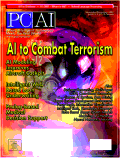|
Features
|
| Intelligence in Terrorist Detection - Our New Secret Agents: Fuzzy Logic and Computational Intelligence in Threat Detection, Validation, and Interdiction Earl Cox examines how advanced artificial intelligence technologies will become crucial to the traditional intelligence service in the fight against terrorism. |
| Improving the Aircraft Cockpit User-Interface: Using Rule-Based Expert System Models Lance Sherry and Michael Feary demonstrate how rule-based expert system models of control system behavior aid the designers in building superior user-interfaces. |
| AI@Work Gaining Competitive Advantage Through Intelligent Automation: Web-Based Loan Underwriting System; Expert System Supports Corporate Families on Overseas Assignments. |
| Natural Language Processing: Understanding its Future Robert Wohleb illustrates NLP's role as a standardized component compatible with future business and technology. |
| Predicting the Effects of Therapy on Patients with Multiple Diseases: Prolog Based Medical Decision-Support Alexander Temiroff, Victor Yukchtenko, and Ilya Belov discuss the Medication Assistant (MA), a Prolog Medical Decision Support System (DSS) that models the effects of therapy on patients with cardiovascular and other medical conditions. |
| It's 2001 - Where is HAL? 2001: HAL's Legacy Terry Hengl reviews an upcoming PBS presentation. |
| Multi-Agent Planning for Network Layout: CBR, CLIPS, Java, Knowledge Base Management Work Together
David Goldstein, Robert Kaminski and Joel Goldstein describe an Air Force-sponsored system to accelerate network configuration using AI technologies. |
| Regulars |
|
| Editorial |
|
| The Book Zone - Information Visualization in Data Mining and Knowledge Discovery Spatial Databases with Application to GIS Fatal Defect: Chasing Killer Computer Bugs |
by Will Dwinnell |
| AI and the Net - AI for Christmas |
by Mary Kroening |
| Product Updates ---------------------------------> |
19 late breaking product announcements from
around the world in the fields of: |
| |
Custom Service Update |
Business Rules |
| |
Data Mining |
Decision Support |
| |
Expert System Development Tools |
Intelligent Tools |
| |
Internet and Web |
Natural Language Processing |
| |
Neural Networks |
Training |
| |
|
| Product Service Guide - Provides access to information
on an entire category of products |
|
|
| PC AI Blackboard - AI advertisers bulletin board |
|
|
Guest Editorial:
A New Spotlight on Intelligence in Intelligence
|
Over the past year or so I have been writing about the use of fuzzy logic in expert and machine learning systems. While the general thrust of these articles have been towrad enabling business intelligence and knowledge management applications, we should never forget that the underlying technological capabilities inherent in fuzzy models are critical for the success of modern intelligence models. Fuzzy systems provide a broad and powerful paradigm not only for rule-based expert systems but also for deeply insightful knowledge discovery systems. A fuzzy rule induction capability, one that learns from data, can create models of unusual flexibility and sensitivity. |
| |
In fact, a recent DSstar (www.tgc.com/dsstar) Analysis and Commentary article, "Lots of Clues, But No One to Analyze Them," discussing the failure of the intelligence community to stop the Sept. 11th attacks, quotes a number of intelligence sources and concludes, |
| |
. . . [the] real lesson of Sept. 11 is the need to better synthesize data already being collected. Now there's new emphasis on hiring analysts, beefing up computers' "fuzzy logic" capabilities, and expanding the agencies' linguistic firepower." |
| |
The article goes on to say, "The need to better analyze all this traffic has placed a renewed concentration on things like "fuzzy logic" computing." |
| |
Today's threat to civilization involves subtle and far-reaching activities, spread across months or years, that are extremely difficult to detect. While new technologies such as fractal pattern matching of retinal blood vessels, standing brain wave identification, mitochondria-based blood chemistry analysis (using a machine familiar to nearly all diabetics) and subsonic voice recognition are providing ever higher levels of physical security, they do not address the fundamental issues of terrorism - do the unexpected with the least risk of exposure causing the maximum amount of damage. Terrorists can always find ways around physical barriers - but they cannot find ways around their own behaviors. Recent strides in swarm intelligence models (which can simulate and predict the behavior of terrorist cells) in applying re-generative evolutionary programming to shards and weakly perceived evidence, and the use of fuzzy logic as the primary logical foundation for these models has begun to yield results and, consequently, to find their way into the armory of the intelligence community. These new AI capabilities will change the way we fight wars against global terrorism in the new millennium. |
| |
As a final "I told you so," - those of us who have been preaching the intrinsic advantages of fuzzy models - their ability to easily handle conflicting experts, their ability to fuse and evaluate evidence, their ability to handle imprecise and vague concepts, their ability to find even weakly emerging patterns among the static of background noise, and their fault tolerance and robustness - can only wonder why it has teken such a momentous and horrific event to open the eyes of both the intelligence community and agencies involved in such areas as urban planning, traffic control, and resource allocation. |
| |
Earl Cox |
